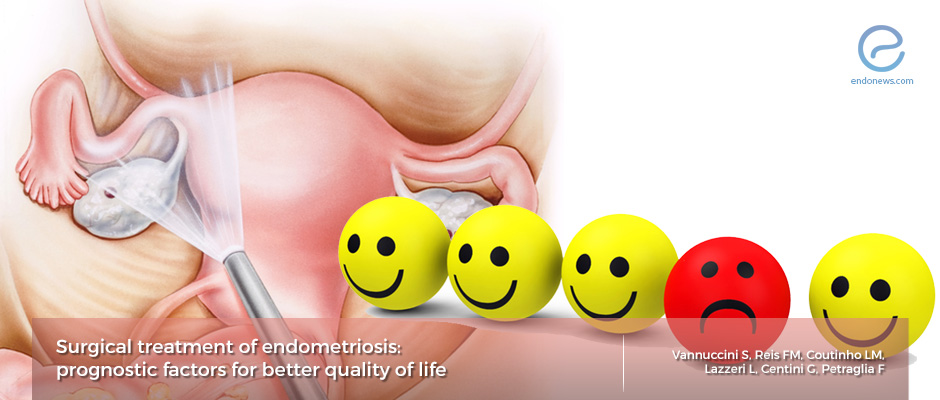Endometriosis and the quality of life
Sep 23, 2019
Planning a laparoscopy for an endometriotic patient needs to be precautious.
Key Points
Highlights:
- Women who underwent diagnostic laparoscopy at age over 30 and usually have a single operation due to her disease, were less affected by lesions or symptom recurrences.
Importance:
- As a chronic disease, endometriosis has a negative impact on the life quality regarding the variable degree of pain symptoms, infertility and stress.
What's done here:
- Authors used a questionnaire to compare physical and mental health in two groups of endometriotic patients to examine the value of early laparoscopic procedures in clinical practice.
Key Results:
- In the research group, endometriotic patients' median physical and mental scale was statistically significantly higher compared to the normal Italian population values.
- Those patients who operated over age 30 usually had one operation, and their quality of life scores were better when compared Group B, those who operated younger.
- Having the first endometriosis surgery in later ages was associated with better health status after stratification for the potential effects of reoperation and pelvic pain.
Limitations:
- The stage and the aggressiveness of the disease should be taken into the account while comparing the two groups.
- It is probable that those patients who were operated at an earlier age had a more aggressive and painful disease.
- Having pain and being operated earlier may certainly be a manifestation of aggressiveness causing frequent recurrences.
- Additional variables that could influence the health status of the patient, such as socioeconomic status, previous mental health, sexuality, coexisting painful conditions and lifestyle habits have not been assessed.
Lay Summary
Recent developments of technics and improvement of skill in the laparoscopic field increased the courage of clinicians to attempt early and multiple diagnostic operations on endometriotic patients.
Vanuccini et al. from NEUROFARBA, University of Florence, Florence, Italy recently published their prospective study aimed to evaluate the relation between early laparoscopy and further quality of life in endometriosis, in the "Journal of Gynecological Endocrinology".
After applying the Questionnaires and SF12 (Short Form 12) to a total number of 153 patients, two main groups were separated regarding their early or late recognition and operations for endometriosis. Group A contains 44 women who diagnosed later and operated as endometriosis, compared to Group B which contains 111 women.
In group A, women who have been diagnosed as endometriosis after their thirties and who have had late operations showed less current pelvic pain and less affected by symptoms or lesion recurrences after comparing the assessment of their questionnaire. (p=.001)
Furthermore, 3 unique phenotypes of endometriosis, namely peritoneal endometriosis, endometrioma, and deep infiltrating endometriosis are more often detected in Group B when compared group A.
Impaired QoL scores predicted that these patients submitted multiple surgical interventions.
Authors claimed that having the first operation in later ages was an independent predictor of better health conditions in endometriotic patients regarding their research results. However, additional variables that could influence the health status of the patient, such as socioeconomic status, previous mental health, sexuality, coexisting painful conditions and lifestyle habits have not been assessed. Those patients who were operated at an earlier age have had an unbearable and intolerably painful disease, and being operated earlier may certainly be a manifestation of aggressiveness causing later recurrences.
Research Source: https://www.ncbi.nlm.nih.gov/pubmed/31155975
premenopausal menarche age diagnosis mental physical scores VAS QoL questionnaire laparoscopy endometriosis.

